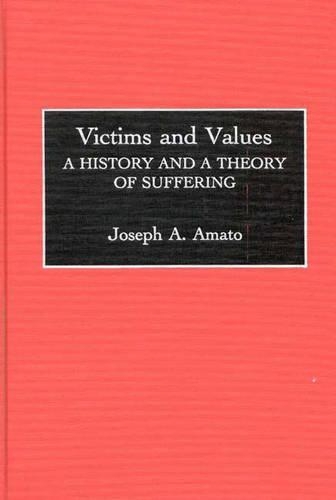
Victims and Values: A History and a Theory of Suffering
(Hardback)
Available Formats
Publishing Details
Victims and Values: A History and a Theory of Suffering
By (Author) Joseph A. Amato
Bloomsbury Publishing PLC
Praeger Publishers Inc
21st November 1990
United States
Classifications
Tertiary Education
Non Fiction
Ethics and moral philosophy
128.4
Physical Properties
Hardback
264
Width 156mm, Height 235mm
567g
Description
This book, which joins history and ethics, conducts a timely inquiry into conscience and politics. Mindful of William James's notion that ethics must be grounded in the historical situation, this book examines fundamental ambiguities, dichotomies, and contradictions that we experience about the worth of our own suffering and that of others. In particular, it analyzes how victims make a powerful claim upon contemporary conscience and politics. Amato distances himself equally from those who deny suffering all substantive meaning and those who fashionably transform it into self-righteous identities and political rhetorics and ideologies. Amato's hope is that each person will be able to take measure of the suffering of others, while still remaining able to value his own suffering. After distinguishing pain from suffering, Amato starts his work with the assumption that humanity must interpret and give meaning to its pains and sufferings. Amato examines the fundamental place of suffering, sacrifice and victims in Greek and Christian cultures. Reaching the central object of his study, the modern mind, Amato shows how the reformist world view of the eighteenth century philosopher sought to reduce suffering to a matter of rational calculation and how the progressive veiws of the nineteenth century dedicated the most profound energies of society and state to the elimination of human suffering. Ironically, in the 20th century this resulted in an increasingly hedonistic society that is preoccupied with suffering and its rights, victims and their claims.
Reviews
"[This book] charts the battles of rival sufferings and claims to suffering: a politics of suffering, curiously waged in an age when moral standards wane, and moral arguments do not get far beyond public rhetoric. . . . [Amato's] analysis is profoundly original, not only in joining history and religion, but in assuming . . . that religion has things to say to late twentieth-century folk. . . . The book . . . [is] an admirable essay."- Eugen Weber from the Foreword
"It has been a rare pleasure to review a book as exciting and illuminating as this one."-Hiroshi Obayashi Rutgers University
Amato has written a genuinely public book about serious public affairs. This work is not simply about knowing but most certainly about doing. . . What a story!-Radical Philosophy Review of Books
This is an important work, tracing a significant history in the development of our Western attitudes toward pain, suffering, and sacrifice and their influence on the political process. Much of its richness is to be found in the historical chapters, whose content could not be summarized in a brief review. Its observations about the present scene are insightful and its caveats significant.-Journal of the American Academy of Religion
"Amato has written a genuinely public book about serious public affairs. This work is not simply about knowing but most certainly about doing. . . What a story!"-Radical Philosophy Review of Books
"This is an important work, tracing a significant history in the development of our Western attitudes toward pain, suffering, and sacrifice and their influence on the political process. Much of its richness is to be found in the historical chapters, whose content could not be summarized in a brief review. Its observations about the present scene are insightful and its caveats significant."-Journal of the American Academy of Religion
Author Bio
JOSEPH A. AMATO is Professor of History at Southwest State University in Minnesota. He has served as a consultant, humanist, and evaluator for several state and national humanities projects. Frequent reviewer, essayist, and the author of several books on ethics, death, and murder, Amato's abiding interest in twentieth century thought is represented by his Mounier and Maritain: A French Catholic Understanding of the Modern World, Ethics: Living or Dead, and Guilt and Gratitude: A Historical Study of the Origins of Contemporary Conscience (Greenwood Press, 1982).
